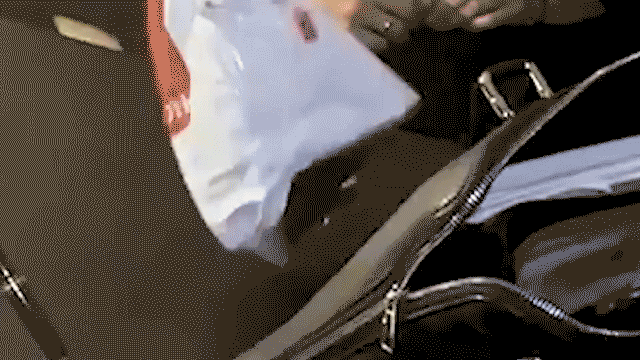ROME – Giuseppe Conte, a bureaucracy-allergic law professor, is hardly a household name in Italy. Yet the 53-year-old academic is the candidate two rival political leaders have chosen to head what they hope will be the country's first populist government.
Say the name "Conte" and the one who comes to the mind of many ordinary Italians is Antonio Conte, the former coach of the Azzurri, Italy's national soccer team. The front page of Milan newspaper Corriere della Sera carried an editorial cartoon Monday playing on the possible premier's lack of a comparable profile.
"For sure, if he were the ex-trainer of the Azzurri, he'd also have some international experience," the cartoon read along with a caricature of a puzzled-looking Italian President Sergio Mattarella,
Conte also has international experience, but it's academic, not political. His resume lists brief periods of study or research at Yale and New York University in the United States, Cambridge in Britain and the Sorbonne in France, as well as teaching positions at public, private and Catholic universities in Italy.
The resume's lack of specificity regarding his time abroad at the foreign universities led to speculation in the Italian media Tuesday that Conte had inflated his affiliations with the elite institutions.
The 5-Star Movement stood by Conte, saying he "had never boasted" of earning degrees from the universities outside Italy, but "stayed abroad to study, enrich his knowledge and perfect his juridical English. For a professor of his level, the opposite would have been strange."
Until 5-Star Movement leader Luigi Di Maio and League leader Matteo Salvini announced him as their pick to take the helm of Italy's next government, the accomplishment of Conte's most Italians might remember hearing about was a kind of "MeToo" achievement.
An expert in civil and commercial law, Conte has served on a government administrative justice council. In that role, he presided over a commission that ousted a public administration official who had demanded that female students in his law course for aspiring magistrates wear mini-skirts to class.
The professor's background features aspects that could please both Di Maio's 5-Star Movement's base, which includes many disgruntled former supporters of the center-left Democrats, as well as Salvini's right-wing constituency.
Dear to the hearts of both Salvini and Di Maio, who rail against the strangling effect of the often byzantine bureaucratic rules Italian businesses and citizens must follow, Conte has declared that given the opportunity, he would slash hundreds of such "useless laws."
When, a few days before the election, the 5-Star Movement presented Conte as the ideal person to be minister for public administration, the professor said the laws needing elimination number "many more than the 400 ones indicated by Luigi Di Maio."
Conte is "an expert of simplification, de-bureaucratization and streamlining the administrative machine, that's what so many businesses want," Salvini said Monday night.
Conte also has pushed for stronger safeguards against corruption, which often finds fertile ground among those trying to circumvent government bureaucracy.
What Salvini might have had to swallow for the price of putting his League in power is Conte's past political affinity for the left.
"In the past, I voted for the left. Today, I think that the ideological schemes of the 20th century are no longer adequate," Conte said earlier this year, when Di Maio was touting him for a Cabinet post. "I believe it's more important to evaluate how a political force works, in terms of its positions on its respect for rights and fundamental liberties. And on its ability to elaborate programs useful for citizens."
In a recent TV program, he put it more succinctly: "My heart has traditionally beat toward the left."
Conte isn't a member of Parliament, but that's not a requirement to be premier. Matteo Renzi, a former Florence mayor, served nearly three years as premier as leader of the Democratic Party and without holding elected office.
Earlier in the haggling between Di Maio and Salvini to cobble together a governing coalition, each man boasted the right to be premier.
Di Maio heads Parliament's largest party after the Movement captured some 32 percent of the votes cast in the March 4 parliamentary election. Salvini's League was the biggest vote-getter in a center-right coalition that together clinched 37 percent.
But after shedding his campaign coalition partners, which included former Premier Silvio Berlusconi's center-right party, Salvini alone commands far fewer seats in Parliament than rival Di Maio.
Each eventually agreed to "take a step aside" and quit demanding the premiership for himself. But with Di Maio aware he would lose his party's base if he agreed to a deal that would put the 5-Stars in government for the first time but without a loyal cheerleader as premier, the choice of Conte made sense.
Born in Volturara Appula, a town of 467 residents near Foggia, in the region of Puglia, Conte is the son of a retired city hall office worker and an elementary school teacher.
His southern roots might please the electorate that helped propel the 5-Stars into power. The Movement's popularity has soared in the south, where its campaign pledge for a guaranteed basic monthly income of 780 euros (then some $950) resonated in a region where youth unemployment tops 50 percent.
Despite his lack of name recognition, Conte has a reputation for being a dapper dresser. When he appeared with Di Maio before the election, Conte was turned out in a three-piece suit with his tie tucked under a button-down gilet and a handkerchief neatly poking out of a breast pocket.








































